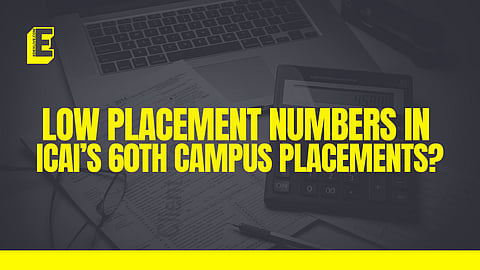

The Institute of Chartered Accountants of India (ICAI) recently completed its 60th Campus Placement Session on December 28, with 240 companies participating, and 4,872 job offers made.
In what is being touted as a landmark achievement in the history of the association, one of the candidates in the placement session was offered a package of Rs 26.5 lakh per annum, the highest this season.
Responding to the developments, ICAI Central Council Member (CCM) Dhiraj Khandelwal took to his X account and wrote, “While other professional degrees, including those from IITs, have experienced slower placement trends, ICAI’s placement programme has seen a significant surge.”
However, many CAs responded by suggesting that the placements in this session had been rather lacklustre, pointing out that only 3,705 candidates were placed out of 15,266 registered candidates.
This development prompts the question: Of the CAs who cleared their Final exams in May 2024, why have only 31 per cent been placed?
While most practising CAs attribute it to the unusually high number of passouts from the May 2024 session, opinions are split on whether the placement data must be seen as a sign of worry.
A sign of falling standards?
CAs say that the reason for the high number of passouts in the first place is the new, relaxed syllabus that was introduced by the ICAI on June 21, 2023.
Under the new syllabus, the number of papers was reduced from eight to six in the Final exam, and the articleship period was reduced from three years to two years. In addition, the ICAI started conducting the exams for the CA Foundation and Intermediate levels thrice a year, instead of twice.
“Through these changes, it seems like the ICAI is focused on making students clear exams rather than gaining knowledge and experience,” says Amar Kumar Mittal, a Chartered Accountant based in Raipur.
Mittal laments that these changes result in a drop in the quality of Chartered Accountants produced by the ICAI. “International certifications like ACCA (Association of Chartered Certified Accountants) and CFA (Chartered Financial Analyst) have reached the Indian market. Companies are looking for those qualifications in potential hires, and Indian CAs are simply falling short,” explains.
Adding to this, Himank Singla, a Chartered Accountant based in Punjab says that companies now also prefer candidates with diversified skills beyond core accounting, such as strategic thinking and proficiency in emerging Artificial Intelligence (AI) tools.
“The inability of some candidates to showcase these skills might have affected their employability,” he adds.
Both CAs agree that this disparity between the skills sought by companies from CAs and the skills possessed by CAs in India is reflected in the salary packages offered in the placement session.
“On closer scrutiny, we can note that the highest domestic salary package dropped from Rs 29 lakh per annum in the previous placement cycle to Rs 26.7 lakh per annum, while the average salary declined to Rs 12.49 lakh per annum from Rs 13.24 lakh,” says Singla.
Mittal alleges that the starting salaries offered to CAs have also reduced over time. “Ten years ago, the average salary offered in placement sessions went up to Rs 70-90 lakh per annum, but that has significantly gone down,” he adds.
Not an anomaly?
However, some CAs reiterate that the high number of applicants this year is the only reason the placement figures appear worrisome, and the actual number of candidates placed does not deviate from the past trends in placements.
“If you look at the 59th Placement Session’s data, you would see that 2,385 candidates were placed in the 3,395 jobs offered. The number of placed candidates has only increased this session,” says Suraj Lakhotia, Co-founder & Director of IndigoLearn EduTech, an online platform for CA exam preparation.
He adds that the placement data must “not be taken at face value” to pass judgements on the standards of ICAI or the quality of CAs that pass out from it.
Moreover, the placement outcomes also depend on several factors other than candidates’ competence or skill levels, and the standards of ICAI’s course, CAs say.
“It is important to remember that the ICAI relaxed the syllabus and increased the number of exams to help students who haven’t been able to clear the exams for over three years. These candidates might have already been working when they cleared the CA Final exam in May, and felt that they didn’t need to appear for the placements,” Chartered Accountant Akhil Pachori says.
According to Singla, candidates might also not prefer to relocate to the job locations, and this mismatch would cause candidates to decline offers, which contributes to the placement numbers too.
Room for improvement?
These perceptions notwithstanding, CAs believe that the ICAI could do more to ensure that the placement numbers improve, irrespective of the number of candidates who register.
“If a strong batch of qualified professionals is being seen as a challenge in the job market, it’s a reflection of systemic inefficiencies, not the students’ merit,” Singla says, adding that ICAI could introduce training programmes on data analytics, digital finance, and regulatory compliance to get students up-to-speed with market demands.
Mittal says that while the new CA syllabus is already equipped to train students on emerging technologies, a sharper focus on AI in finance is also helpful to them.
In addition, both CAs agree that the ICAI must also build stronger partnerships and relations with industry players, to increase the number of opportunities for students, potentially increasing placement numbers.
“Providing candidates with robust career counselling, interview preparation, and resume-building workshops can enhance their employability and success in securing job offers,” Singla states.
